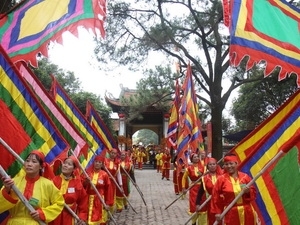The Con Son-Kiep Bac 2013 Spring Festival opened at Con Son pagoda in the northern province of Hai Duong on February 25 (the 16th day of the first lunar month).
 The opening ceremony was attended by Deputy Minister of Culture, Sports and Tourism Dang Thi Bich Lien, Permanent Vice President of the Vietnam Buddhist Sangha's Executive Council Most Venerable Thich Thanh Nhieu, and leaders of Hai Duong province and other localities in the region.
The opening ceremony was attended by Deputy Minister of Culture, Sports and Tourism Dang Thi Bich Lien, Permanent Vice President of the Vietnam Buddhist Sangha's Executive Council Most Venerable Thich Thanh Nhieu, and leaders of Hai Duong province and other localities in the region.
The festival is the first of the four major activities to be launched in Hai Duong province to mark the 2013 National Tourism Year of the Red River-Hai Phong. It aims to commemorate the 679th anniversary of the death of monk Huyen Quang, the third founder of the Truc Lam Zen sect.
Taking place from February 23-26, the festival features a broad range of cultural and sporting activities such as incense offering rituals, worshipping rituals on the Ngu Nhac Mountain, a Chung cake (square glutinous rice cake) and Day cake (round glutinous rice cake) making contest, wrestling, calligraphy and Quan Ho (love duets) singing.
From the 15th to 20th day of the eighth lunar month, the Autumn Festival will be held at Kiep Bac Temple to commemorate national hero Tran Hung Dao, who made great contributions in the fight against Yuan-Mongol invaders from the north in the 13th century.
Covering a total area of eight hectares in Chi Linh district, the Con Son-Kiep Bac historical site is entwined with the lives and causes of Tran Hung Dao and the Great Man of Culture of the World, Nguyen Trai.
The site was a defence line built at the end of the 13th century to protect the Thang Long Imperial Citadel. It witnessed important battles between the Tran dynasty army and the Yuan-Mongol invaders.
Con Son, surrounded by pine trees, saw the pure and upright life of Nguyen Trai (1380-1442), one of Vietnam's most famous poets and writers.
Con Son-Kiep Bac was recognised as a national heritage site in 1962 and a special national heritage site in 2012. The same year, the Ministry of Culture, Sports and Tourism awarded the Spring Festival the title of national intangible cultural heritage.